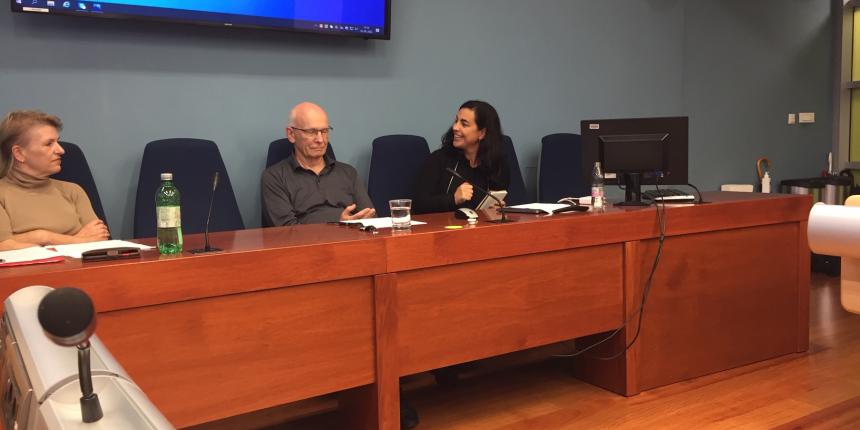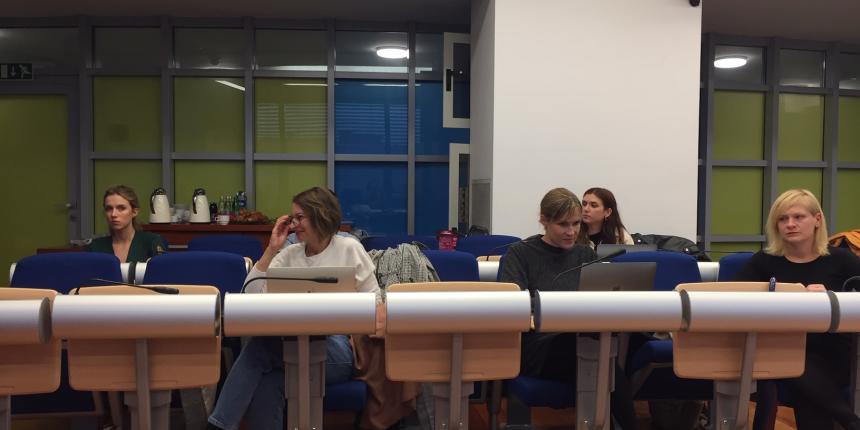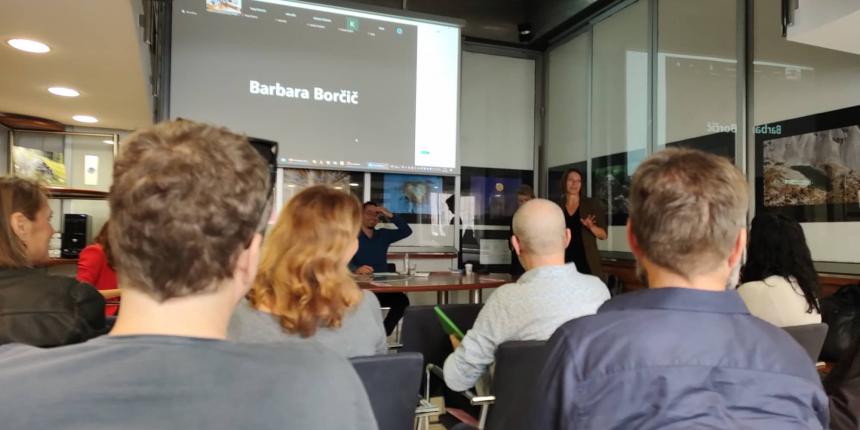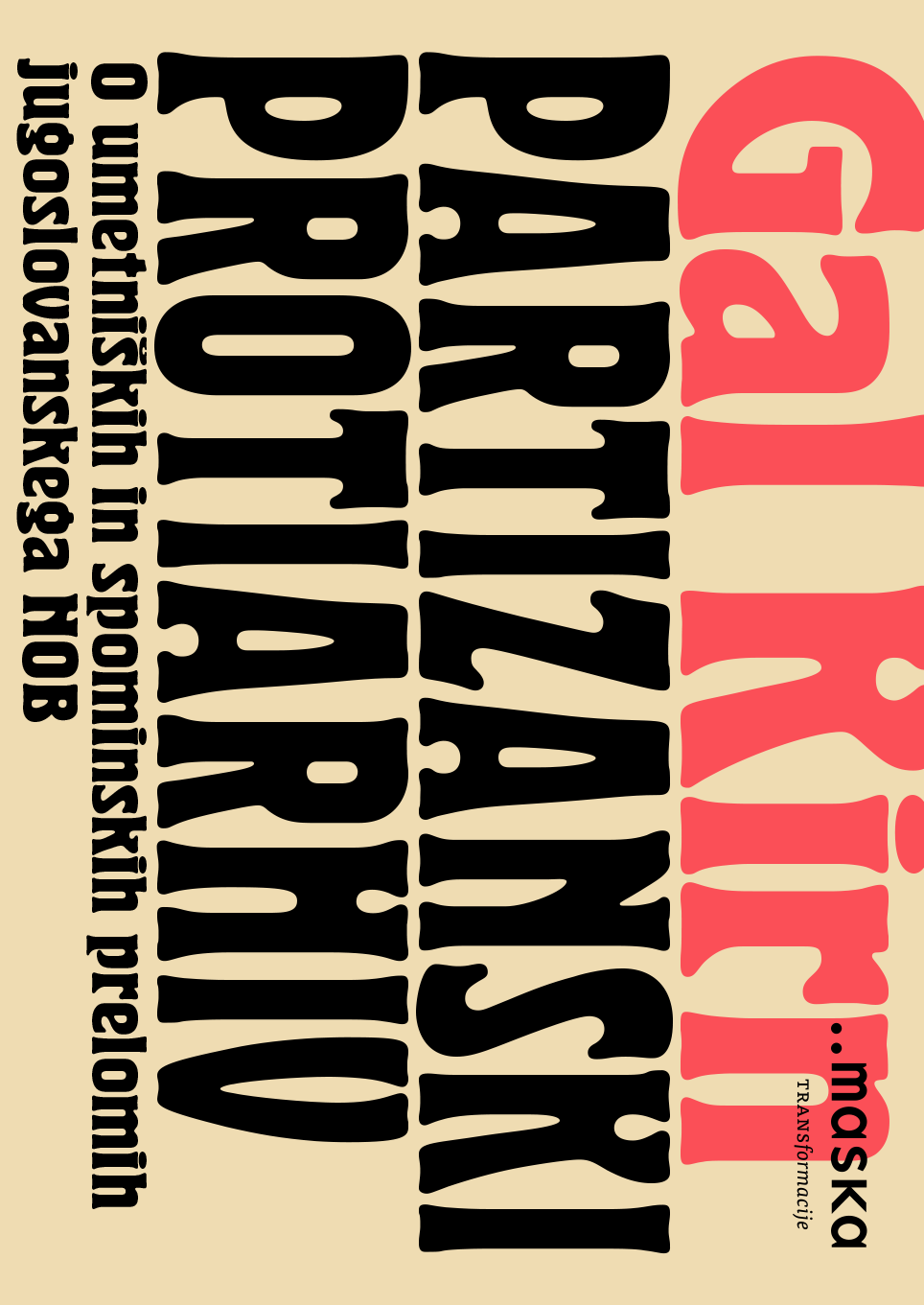

Protests, art practices and culture of memory in the post-Yugoslav context
About project
|
UL member |
University of Ljubljana, Faculty of Arts |
|
Project number |
J6-3144 |
|
Project title |
Protests, art practices and culture of memory in the post-Yugoslav context |
|
Project duration |
1. 10. 2021 - 30.9. 2024 |
|
Number of FTE's |
1,57 FTE |
|
Project leader |
Gal Kirn |
|
Science |
Humanities / Cultural Studies |
|
Participating research organizations |
ZRC SAZU FDV ALUO |
Short description
The project researches the role of artistic practices, the culture of memory and protests in the last period of post-socialist transition in the post-Yugoslav context. If the first decade of transition was marked by ethnic wars and demise of socialist welfare state, then the last decade was marked by the rise of authoritarian neoliberalism and a strengthening of social inequalities. What was once held high as neoliberal utopia in the pursuit of individual happiness through entrepreneurialism has been brought to an end, and with it, one of the flagships of the post-socialist transition also fell: the belief that the transition is leading to an "open", democratic and more just society. This project starts from a key premise of critical theory, which argues that transition is (has been) neither a homogeneous nor a neutral process, but a process marked by a series of contradictions and even regressions, which at the most extreme point manifest themselves in wars and rehabilitation of local fascism. The research focus is based on the case studies from Slovenia, but also includes an analysis of some important cases and events from the selected post-Yugoslav countries. The project addresses three main sets of questions: (1) What are the key commonalities and differences of transition in the post-Yugoslav context? How have alternative politics and art responded to the collateral damage / negative effects of the transition? (2) How did alternative practices mobilise emancipatory traces of the past (Yugoslavia, partisan struggle, self-management) that go beyond nostalgia? (3) Who were the real agents of democratisation, and in which places and with which demands did the protests and uprisings succeed in shaking up the hegemonic constellation, and in which places did they merely support the status quo?
Objectives
The project brings together two main approaches of the existing literature on post-socialist transition, critical economic analysis and cultural analysis that have often remained methodologically separated. The combination of these two approaches is going to be articulated on selected examples: from protests and revolts to political art and alternative memory projects. In this perspective, central objective consists of data collection and analysis of the case studies, which will enable a critical comparative perspective. Finally, the goal is to evaluate the democratic potential of political art for democratic politics and whether alternative memory practices succeeded to move beyond conservative revisionism or Yugonostalgia.
Principle investigator
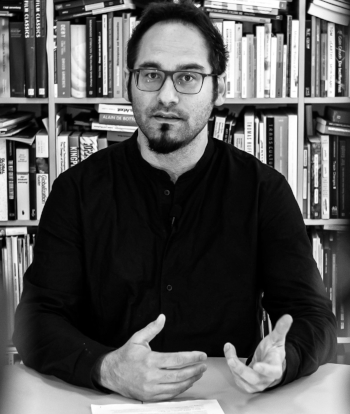 Dr Gal Kirn is a research associate at the University of Ljubljana, and has been working for last 10 years in the German academic context (Institute of Cultural Inquiry - ICI Berlin, Humboldt University, TU Dresden, GWZO Leipzig). He is also affiliated with Södertörn University (Sweden) and a part of international research group Partisan Resistances (University of Grenoble). Kirn's research has focused on the theme of transition in (post)socialist context, in particularly in the fields of art, politics and memory in the period of national liberation struggle and the socialist Yugoslavia. He led a research project Counter Archives (Rosa Luxembourg Foundation at ICI Berlin) and published two monographs Partisan Ruptures (Pluto Press, 2019) and Partisan Counter-Archive (De Gruyter, 2020). Kirn recently co-edited (with Natasha Ginwala and Niloufar Tajeri) a volume Nights of the Dispossessed. Riots Unbound (Columbia Press, 2021), and with Marian Burchardt Beyond Neoliberalism (Palgrave, 2017).
Dr Gal Kirn is a research associate at the University of Ljubljana, and has been working for last 10 years in the German academic context (Institute of Cultural Inquiry - ICI Berlin, Humboldt University, TU Dresden, GWZO Leipzig). He is also affiliated with Södertörn University (Sweden) and a part of international research group Partisan Resistances (University of Grenoble). Kirn's research has focused on the theme of transition in (post)socialist context, in particularly in the fields of art, politics and memory in the period of national liberation struggle and the socialist Yugoslavia. He led a research project Counter Archives (Rosa Luxembourg Foundation at ICI Berlin) and published two monographs Partisan Ruptures (Pluto Press, 2019) and Partisan Counter-Archive (De Gruyter, 2020). Kirn recently co-edited (with Natasha Ginwala and Niloufar Tajeri) a volume Nights of the Dispossessed. Riots Unbound (Columbia Press, 2021), and with Marian Burchardt Beyond Neoliberalism (Palgrave, 2017).
Researchers
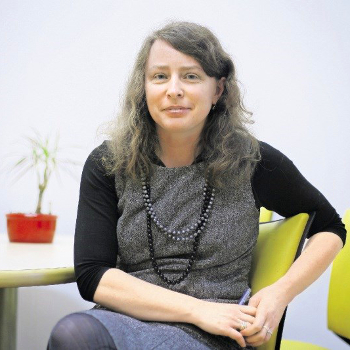 Dr Ksenija Vidmar Horvat is a full professor of Sociology of Culture at the Faculty of Arts and has led or participated in dozens of research projects within the ARRS and at European level. She is currently the head of the programme group "The Social Contract in the 21st Century" (2015-2025). She has published numerous texts and edited several books, including Periferna Evropa: tranzitologija in postkrizni diskurzi v jugovzhodni Evropi (2018), Zamišljena mati: spol in nacionalizem v kulturi 20.stoletja (2013), and edited 9 translations of theoretical works into Slovene.
Dr Ksenija Vidmar Horvat is a full professor of Sociology of Culture at the Faculty of Arts and has led or participated in dozens of research projects within the ARRS and at European level. She is currently the head of the programme group "The Social Contract in the 21st Century" (2015-2025). She has published numerous texts and edited several books, including Periferna Evropa: tranzitologija in postkrizni diskurzi v jugovzhodni Evropi (2018), Zamišljena mati: spol in nacionalizem v kulturi 20.stoletja (2013), and edited 9 translations of theoretical works into Slovene.
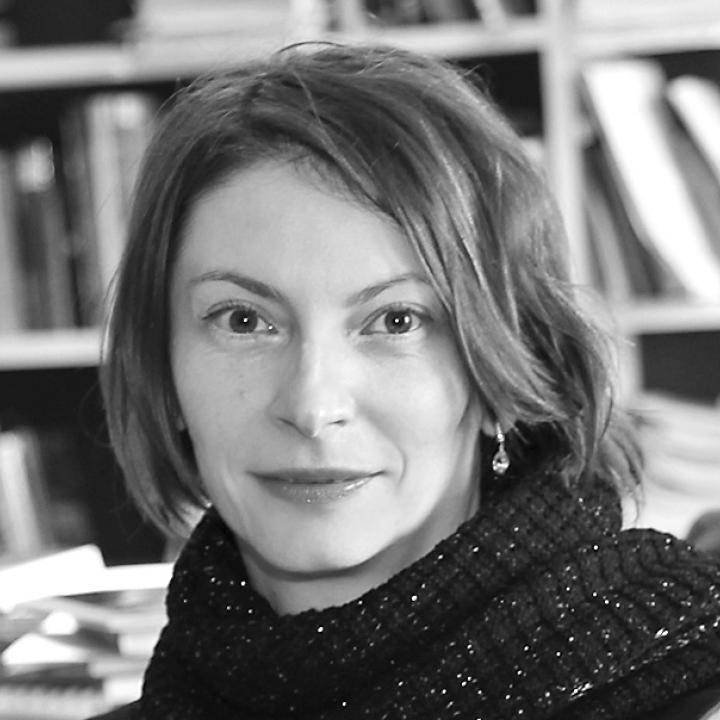 Dr. Ana Hofman is ethnomusicologist and anthropologist, is a senior research fellow at the Institute of Culture and Memory Studies of the Slovenian Academy of Science and Arts in Ljubljana. Her research interests lie in the intersection between music and sound studies and memory studies, with a focus on activism and the social meaning of resistance in the past and present. She uses both archival and ethnographic methods to examine musical sound during socialism and the present-day conjuncture of neoliberalism and postsocialism in the area of former Yugoslavia. She has published many articles and book chapters, including two monographs: Staging Socialist Femininity: Gender Politics and Folklore Performances in
Dr. Ana Hofman is ethnomusicologist and anthropologist, is a senior research fellow at the Institute of Culture and Memory Studies of the Slovenian Academy of Science and Arts in Ljubljana. Her research interests lie in the intersection between music and sound studies and memory studies, with a focus on activism and the social meaning of resistance in the past and present. She uses both archival and ethnographic methods to examine musical sound during socialism and the present-day conjuncture of neoliberalism and postsocialism in the area of former Yugoslavia. She has published many articles and book chapters, including two monographs: Staging Socialist Femininity: Gender Politics and Folklore Performances in
Serbia (Brill, 2011) and Music, Affect, Politics: New Lives of Partisan Songs in Slovenia (ZRC 2015). She is currently working on the monograph Socialism, Now! Music and Singing Activism after Yugoslavia (OUP) dealing with the sonic repurposing of cultural memory on antifascism in the societies of neoliberal fringe.
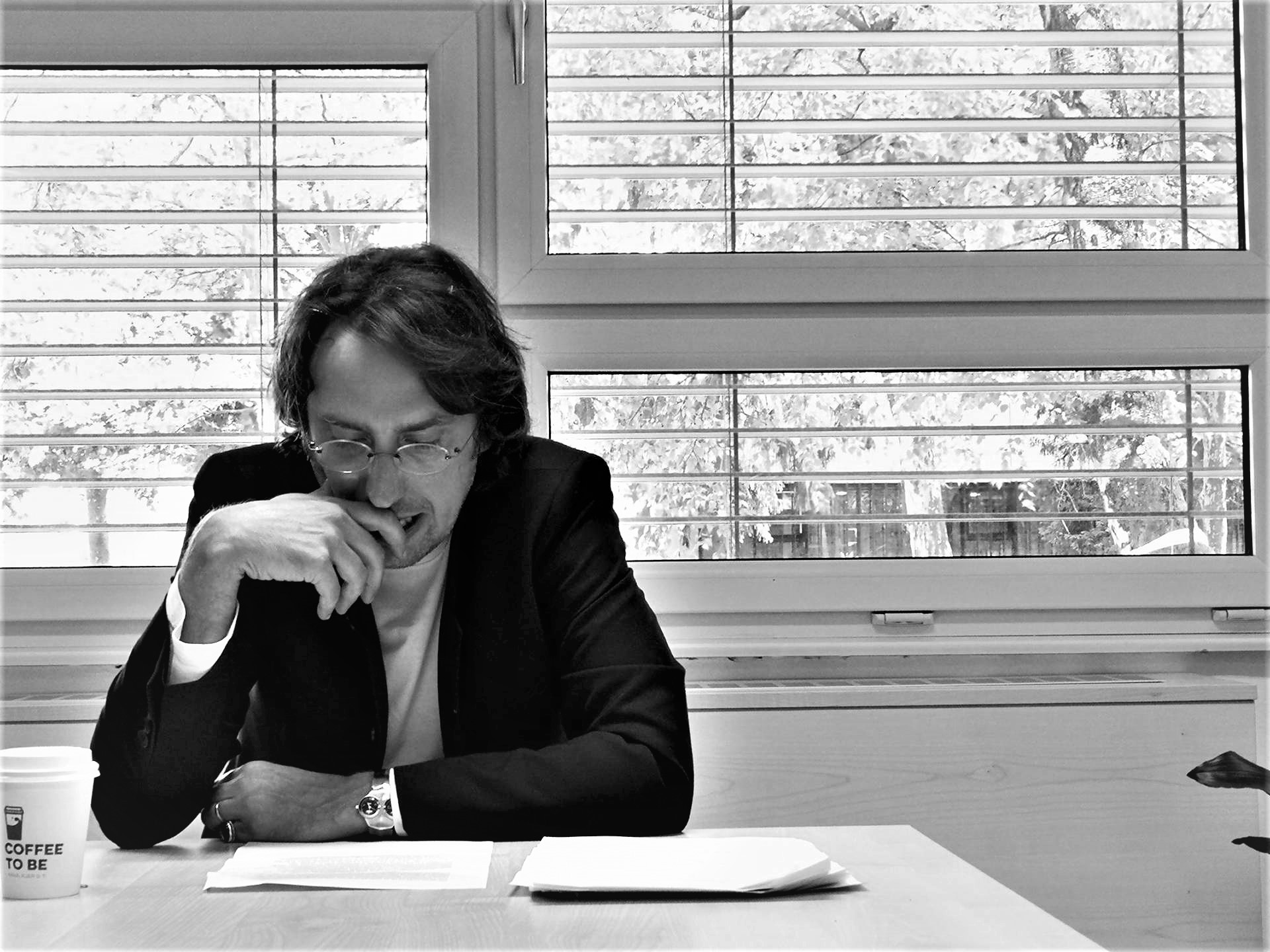 Dr. Mirt Komel is an assistant professor at the Faculty of Philosophy, Philosophy and Writing (2010), and teaches Modern Philosophy and Literature at the Department and Chair of Cultural Studies at the Faculty of Social Sciences, UL. His research interests include the Centre for the Study of Culture and Religion at the Institute of Social Sciences, the Institute of Philosophy at the Faculty of Arts, UL, and the Peace Institute in Ljubljana. He is the author of several scholarly monographs: Diskurz in nasilje (2010); Twin Peaks in postmodernizem (2013), Sokratski dotiki (2015) in Giljotina duha (2018).
Dr. Mirt Komel is an assistant professor at the Faculty of Philosophy, Philosophy and Writing (2010), and teaches Modern Philosophy and Literature at the Department and Chair of Cultural Studies at the Faculty of Social Sciences, UL. His research interests include the Centre for the Study of Culture and Religion at the Institute of Social Sciences, the Institute of Philosophy at the Faculty of Arts, UL, and the Peace Institute in Ljubljana. He is the author of several scholarly monographs: Diskurz in nasilje (2010); Twin Peaks in postmodernizem (2013), Sokratski dotiki (2015) in Giljotina duha (2018).
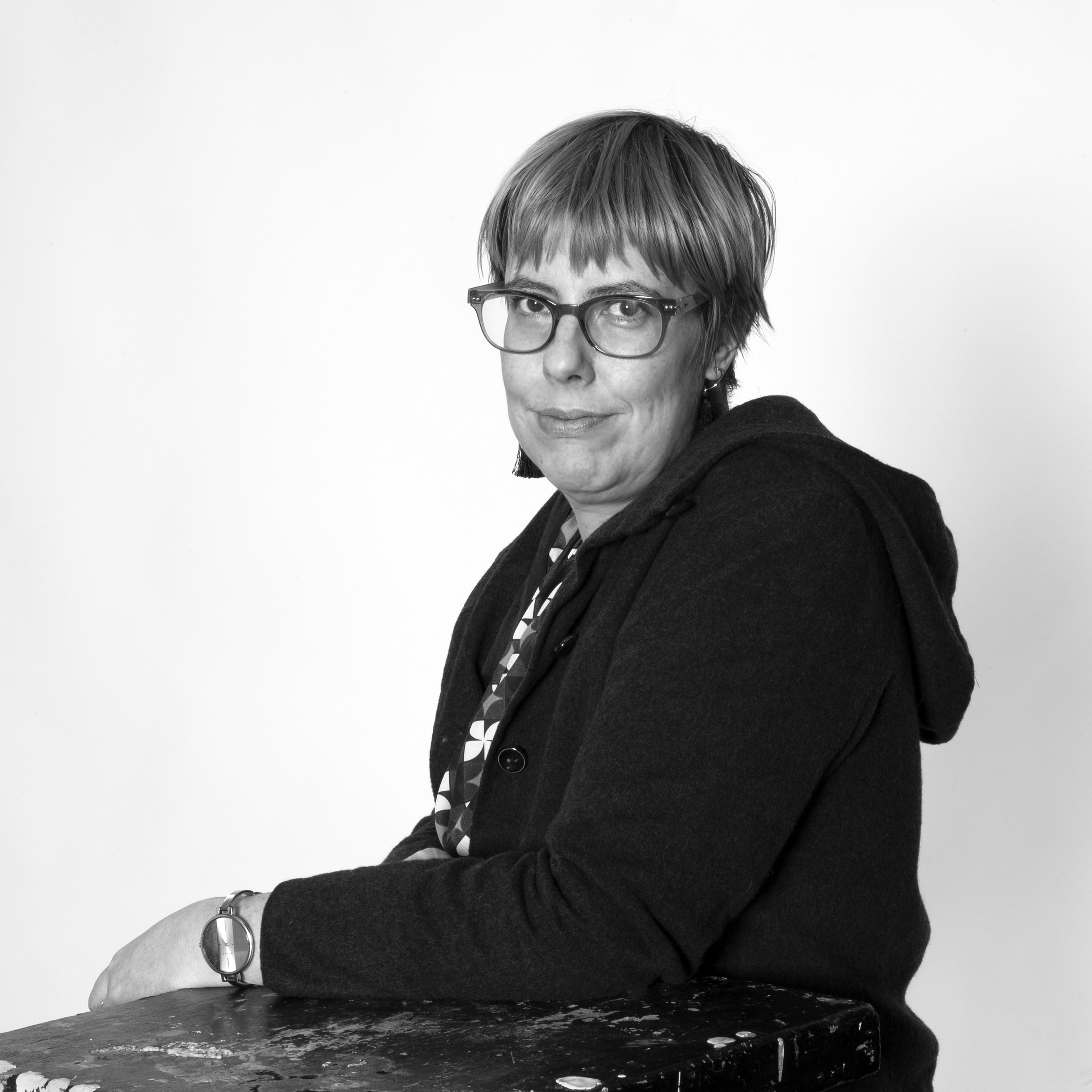 Dr. Petja Grafenauer is an assitant professor at the Academy of Fine Arts. In 2010, she completed her PhD on Parallel Pictorial Line: Slovenian Painting of the Expanded Status of the Visual 1926-2009. She is a specialist in local and regional art after World War II, especially painting and contemporary art. Since 2012 she has also been researching the intersections of economics and art. She has written and edited several books on visual art, including a study of the Pop Art period in Slovenia, Neuvrščeni pop (2017), knjigo besedil Zdenke Badovinac Avtentični interes (2010) in monografijo slikarja Aleksija Kobala (2008).
Dr. Petja Grafenauer is an assitant professor at the Academy of Fine Arts. In 2010, she completed her PhD on Parallel Pictorial Line: Slovenian Painting of the Expanded Status of the Visual 1926-2009. She is a specialist in local and regional art after World War II, especially painting and contemporary art. Since 2012 she has also been researching the intersections of economics and art. She has written and edited several books on visual art, including a study of the Pop Art period in Slovenia, Neuvrščeni pop (2017), knjigo besedil Zdenke Badovinac Avtentični interes (2010) in monografijo slikarja Aleksija Kobala (2008).
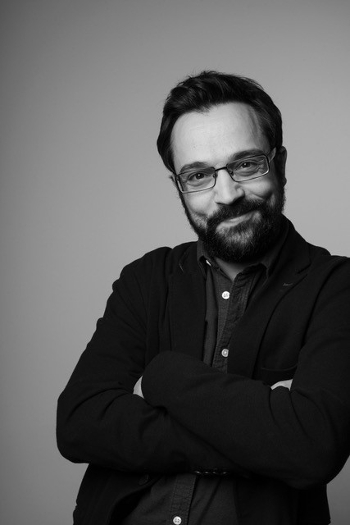 Dr. Igor Štiks is a professor at the Faculty of Media and Communication in Belgrade and has also worked at the University of Edinburgh. A cultural theorist, dramaturge and writer, Štiks has published extensively in various books and edited collections, Nations and Citizens in Yugoslavia and the Post-Yugoslav States: One Hundred Years of Citizenship (Bloomsbury, 2015). With Jo Shaw, he published Citizenship after Yugoslavia (Routledge, 2013), and with Srećek Horvat, the edited collection Welcome to the Desert of Post-Socialism: Radical Politics after Yugoslavia (Verso, 2015). He was also the project leader of the international project "Citizen-Artist: creative citizenship in occupied places«, Early Career Leverhulme Trust Fellowship, 2014-2017, University of Edinburgh, Scotland. He is alos employed as a visiting researcher in the program group “Social Contract in the 21st Century” (Faculty of Arts, University of Ljubljana).
Dr. Igor Štiks is a professor at the Faculty of Media and Communication in Belgrade and has also worked at the University of Edinburgh. A cultural theorist, dramaturge and writer, Štiks has published extensively in various books and edited collections, Nations and Citizens in Yugoslavia and the Post-Yugoslav States: One Hundred Years of Citizenship (Bloomsbury, 2015). With Jo Shaw, he published Citizenship after Yugoslavia (Routledge, 2013), and with Srećek Horvat, the edited collection Welcome to the Desert of Post-Socialism: Radical Politics after Yugoslavia (Verso, 2015). He was also the project leader of the international project "Citizen-Artist: creative citizenship in occupied places«, Early Career Leverhulme Trust Fellowship, 2014-2017, University of Edinburgh, Scotland. He is alos employed as a visiting researcher in the program group “Social Contract in the 21st Century” (Faculty of Arts, University of Ljubljana).
Support Group
Dr. Daša Tepina holds a PhD of Sociology and is an assistant researcher for art theory at the ALUO Department for Theory, University of Ljubljana. Her main research interests include social movements, autonomous spaces and communities, anarchism, art and utopias. Currently she is working on a research project with a focus on analysing dynamics of cultural exchange in the non-aligned movement.
Karla Tepež is a doctoral student at the Faculty of Social Sciences, UL. Her research is focused on protest art as a specific political practice and its potential for social change. She holds a master’s degree in Political Science and is currently preparing her dissertation on the political potential of collective artistic practices and their contribution to the new ways of being together otherwise in the post-Yugoslav context.
Dr Nina Cvar, assistent on the sociology department has joined the support group of the research project. She has been active on the fields of film analysis, critique of power relations and other topics.
Dr Katja Kobolt is a researcher, curator, and art educator. Kobolt initiated and realised research, publication, art and culture projects in collaboration with different institutions and feminist as well as post-migrant groups (e.g. Red Mined trans-Yugoslav curatorial collective, n*a*i*l*s hacks*facts*fictions) and institutions (e.g. City of Women Ljubljana, 54th October Salon Belgrade, Lothringer 13 Munich) and taught at the Berlin University of the Arts and the Humboldt University as well as at the Ludwig-Maximilians-Universität in Munich. With research on Yugoslav socialist publishing for children, she is currently a researcher within the Marie Skłodowska-Curie Action at the Institute of Culture and Memory Studies at ZRC SAZU Ljubljana.
Mag. Vid Lenard is a lecturer at the University of Primorska, Faculty of Education, where he teaches History of Art in the Visual Arts and Design and Dance Studies programmes. His research focuses on art historical and theoretical aspects of art. He is currently enrolled in the PhD programme at the Academy of Fine Arts and Design (ALUO), where he is researching the topic: 'Examples of artistic practices in the 1970s in Yugoslavia as an affirmation or subversion of social self-management'.
Ifeta Lihić graduated from the University of Sarajevo with a Bachelor of Arts in Comparative Literature and earned a GEMMA double master's degree in Women's and Gender Studies from Central European University and The University of York. As a curator and digitization manager at the Museum of Literature and Performing Arts of Bosnia and Herzegovina, she has focused on archiving authors from minority traditions. Her PhD research explores how archival practices shape cultural canons and political narratives in post-socialist Bosnia and Herzegovina, with a focus on the marginalization of subcultures and alternative canons. She is also interested in affect theory, museology, post-socialism, women’s history, and the institutional remembrance of socialist history in Bosnia and Herzegovina. Lihić is a doctoral student at the Faculty of Social Sciences at the University of Ljubljana.
International Committee - External Partners
Jelena Vasiljević is a Senior Research Fellow at the Institute of Philosophy and Social Theory (University of Belgrade). Her background is in political anthropology and citizenship studies. She has written on debates on culture and citizenship, on the transformation of citizenship in post-Yugoslav countries, on the politics of memory, and on media narratives during the Yugoslav wars of the 1990s. Her current research interests are the politics of solidarity, active citizenship and social movements in the Balkans.
Cecilia Sjöholm is Professor of Aesthetics at Södertörn University. She holds a PhD in Comparative Literature from Stockholm University and a PhD in Philosophy from Radboud University in the Netherlands. She has published widely on the history of aesthetics. Her books deal with art and Greek tragedy, aesthetics and phenomenology, and more recently with Yugoslav avant-garde art and memory. Her major books include Doing Aesthetics with Arendt. How to See Things (Columbia University Press, 2015), Kristeva and the Political (Routledge, 2005).
Florian Bieber is a Professor of Southeast European History and Politics and Director of the Centre for Southeast European Studies at the University of Graz, Austria. He holds a Jean Monnet Chair in the Europeanisation of Southeastern Europe. He studied Political Science and History at Trinity College (USA), the University of Vienna, and Central European University (Budapest). He is also a Visiting Professor at the Nationalism Studies Program at CEU. Recent publications include Negotiating Unity and Diversity in the European Union (Palgrave 2021, with Roland Bieber), Debating Nationalism (Bloomsbury 2020) and The Rise of Authoritarianism in the Western Balkans (Palgrave 2020).
Sanja Horvatinčić is a Postdoctoral Researcher at the Institute of Art History in Zagreb, Croatia. Her research focuses on modernist memorial sculpture and architecture, and the production of history through cultural practices in socialist Yugoslavia. She employs critical interdisciplinary approach to heritage to investigate contemporary potential of Yugoslav memorial structures and concepts. She has published extensively on these topics and ever since 2020, she has been a researcher in the international project Models and Practices of Global Cultural Exchange and Non-aligned Movement. Research in the Spatio-Temporal Cultural Dynamics.
Katja Diefenbach is a Professor of Philosophy of Culture at European University Viadrina Frankfurt (Oder). Her interests cover contemporary political and memory theories, in particular on the concepts of potentiality, time and event, (post)structuralist French theory, postcolonial, feminist and Marxist theories,Spinoza research and aesthetic theory. She has published various texts on these fields, her last book was published in 2018 by Turia + Kant Spekulativer Materialismus. Spinoza in der postmarxistischen Philosophie. She is a member of the publishing collective and venue b_books.
Each phase will consist of a research aspect (reading texts, analysing cases, comparing) and a dissemination/organisation aspect (either hosting/lecture or workshop/conference).
In Phase 1 (the first 10 months), a research team will be constituted and a first work package will be carried out, i.e. an evaluation of the literature of the post-socialist transition. We will focus on the main conceptual innovations in the field of post-socialist transition and (neo)democratic change. We will be particularly interested in analysing the effects of neoliberalism and nationalism in the post-Yugoslav context. The shorter papers and critical summaries will then be reflected upon in the first workshop (FF), where the research team and invited experts will participate. This work package touches on macro analysis, which will be reflected in the following work packages in the fields of politics, art and memory. This phase will provide the research team with a broader framework and theoretical lenses through which to read and intervene in the next work packages. Outputs/implementation: inception meeting; workshop 1; shared 'library' (bibliography); guest lecture. Coordinated by Kirn.
In the second phase (months 10-22) we will focus on case studies in the field of protest: protest, urban initiatives and uprisings. This package looks at various political protests and uprisings that have taken place across the former Yugoslavia over the last decade. The central analysis will be the case of the uprisings in Slovenia in 2012/13 and 2020, but other shorter case studies of urban initiatives will also be presented. We will be interested in what were the reasons and triggers of the insurgency, and at which points the conflict was established. At the same time, this part of the project will assess the democratic potential of new political subjectivities. Implementation/results: we will present the results of the research at Workshop 2 (FDV), and compare some of the cases with external partners (hosting in Belgrade). Coordinated by Kirn, Štiks, Komel, Grafenauer.
In the third phase (months 16-28) we will work on the work package Political art: art groups and actions. We will focus on the analysis of different art collectives and works that have become more political in the last two decades. We will look at the relationship between art and politics (artistic activism, aesthetics of resistance) and answer the question: has and how has politicised art become an agent of democratisation and a vehicle of alternative memory? What have been the main strategies of political art and does the increasing culturalisation and visibility of political art speak of a narrowing of the post-socialist political space? Outcomes: case studies will be discussed in Workshop 3 (ALUO), and a short study visit to Sodertorn University. Coordinated by Grafenauer, Hofman, Komel.
In the fourth phase (months 22-34) we will work on the package Cultural Politics of Emotions: beyond revisionism and nostalgia. From the very beginning of the transition, this area has been permeated by radical contradictions, emotions, the mobilisation of nationalism and nostalgia. We will assess the status and relevance of emotions in the field of political art and memory, and analyse in more detail the extent to which political and artistic initiatives have succeeded in mobilising the legacies of the past (especially the partisan heritage). The research hypothesis assumes that new memory reactivation projects have succeeded in transcending (Yugo)nostalgia and revisionism. The results will be presented in Workshop 4 (ZRC SAZU), and compared with other cases during the hosting in Zagreb. Coordinated by Hofman.
The final phase (months 32-36) is devoted to the editing of the contributions to the international proceedings (the last internal workshop 5 at the Faculty of Arts will be held to discuss the contributions received for the international proceedings, and to close the project), and to the holding of an international conference, which will touch on all the work packages. Finally, the final and financial report will have to be written. Coordinated by Kirn and Hofman.
KIRN, Gal
1.“Anti-Totalitarian Monuments in Ljubljana and Brussels” in European Memory in Populism, ur. Kaya Ayhan in Chiara de Cesari. London: Routledge, 2019.
2. The Partisan Counter-Archive. Retracing the Ruptures of Art and Memory in the Yugoslav People's Liberation Struggle. Berlin: De Gruyter, 2020.
HOFMAN, Ana
1.Disobedient: activist choirs, radical amateurism and the politics of the past after Yugoslavia, Ethnomusicology, 2020.
2. Glasba, politika, afekt: novo življenje partizanskih pesmi v Sloveniji [Music, Politics, Affect: New Lives of Partisan Songs in Slovenia] (Zbirka Kulturni spomin). Ljubljana: Založba ZRC, ZRC SAZU, 2015.
GRAFENAUER, Petja
1. BETZLER, Diana, GRAFENAUER, Petja, LOOTS, Ellen, PROKŮPEK, Marek, MARQUES, Lénia. COVID-19 and the arts and cultural sectors : investigating countries' contextual factors and early policy measures. The international journal of cultural policy, ISSN 1477-2833. [Online ed.], 11. Nov. 2020, str. 1-19.
2. GRAFENAUER, Petja, TEPINA, Daša. Art, artists, autonomous communities, and rebellion : case of Ljubljana 2020/2021. V: European Avant-Garde : a hundred years later : book of abstracts. [Ljubljana: Slovensko društvo za estetiko. 2021], str. 31.
KOMEL, Mirt
1. “Splitting Eurobalkanism : Europeanisation of the Balkans, Balkanisation of Europe - a short psychoanalytical observation.” V: ZIMMERMANN, Tanja (ur.), JAKIR, Aleksandar (ur.). Europe and the Balkans : decades of Europeanization?. Würzburg: Königshausen & Neumann. cop. 2015, str. 81-86.
2. “Mi o volku, Vučko iz Sarajeva.” V: PETROVIĆ, Tanja (ur.), et al. Made in YU 2015. Ljubljana: Založba ZRC, ZRC SAZU. 2016, str. 176-183
VIDMAR, Ksenija Horvat
1. Evropski spomin in vizualizacija travme : vloga umetniške reprezentacije v medijskem projektu "Begunec_ka sem". V: MATAJC, Vanesa (ur.), VIRANT, Špela (ur.). Migracije = Migrations. Ljubljana: Znanstvena založba Filozofske fakultete. 2016, letn. 10, št. 2, str. 13-30, ilustr.; angl. European Memory and Visualizations of Trauma: The Function of Artistic Representation in Media-Project "I am a Refugee", https://revije.ff.uni-lj.si/arshumanitas/issue/view/592/376
2. “Visualisation of the “Balkan road”: Media representations of the refugee crisis at the periphery of Europe”
ŠTIKS, Igor
1. Štiks, Igor and Krunoslav Stojaković. 2021, The New Balkan Left: Struggles, Successes, Failures, Belgrade: Rosa Luxemburg Stiftung SEE, ISBN 978-86-88745-46-8, https://www.rosalux.rs/en/new-balkan-left
2. “Activist Aesthetics in the Post-Socialist Balkans: Resistance, Rebellion, Emancipation”, Third Text – Critical Perspectives on Contemporary Art and Culture, Vol. 34, No. 4-5, 461-479, 2020. https://www.tandfonline.com/doi/abs/10.1080/09528822.2020.1834735?journalCode=ctte20
News
Mag. Ifeta Lihić and mag. Vid Lenard joined the research group. They are working on their dissertation projects on the topics of cultural and artistic practices in the (post)Yugoslav context
Our research team - and a few others - have published their papers in a double issue of Anthropos 56 (1), 2024. They are all available in the public domain at https://doi.org/10.26493/2630-4082.56_1 and the table of contents is as follows:
- Ksenija Vidmar Horvat, Rememorizing Memories
Rememorising Memories of War and Transition
- Igor Štiks, Hypochondria as Collective Syndrome? Nationalist-Conservative Hegemony in the Balkans, and How to Fight It
- Daša Tepina and Petja Grafenauer, Art and Revolt: From the Socialist Republic of Slovenia to Today
- Gal Kirn, Postajanje tovarišev v boju: umetnost in skrb za nečloveški svet ter partizanska subjektivnost v jugoslovanskem narodnoosvobodilnem boju
- Ana Hofman, ‘Revolution is Learned Faster than Culture’: On the Amateur-Professional Relationship in the Artistic Legacies of the People’s Liberation Struggle
- Katja Kobolt, Literature Builds Children, Children Build Literature: Literary Education in Socialist Yugoslavia and Children’s Literary Agency
Memorising through Comics/Graphic Novels
- Tanja Petrović, Graphic Memories of Yugoslav Wars: Rat by Ðo & Dju and Vojna by Goran Duplančić
- Nina Cvar and Zora Žbontar, Engaging Miki Muster’s Legacy: Remembering Zvitorepec (Slyboots) in Contemporary Slovenia
- Robin R. Mudry, Saudek and Macourek’s Muriel: (After)Lives of a Czechoslovak
Anti-Normalisation Superheroine - Mirt Komel, Alan Ford Goes to Yugoslavia: From Tautology to Ideology
Konferenco so organizirali Daša Tepina, Petja Grafenauer in Gal Kirn.
Vabilo na seminar, ki se bo odvil v Atriju ZRC SAZU 8.11. 2023 v sodelovanju s Katjo Kobolt, Galom Kirnom in Suzano Milevsko, APOLOGOSCAPES: (Counter)productivities of apologies in politics, art, and institutional infrastructures – one-day cross-disciplinary seminar.
3. 7.11. vabimo na predstavitveno predavanje dr Giustine Selvelli, ob 16.uri v Modro Sobo. Vodja raziskovalnega projekta Gal Kirn je namreč skupaj z Giustino Selvelli pridobil dvoletno postdoktorsko štipendijo programa Eutopija, ki jo bo izvajala na oddelku za sociologijo.
Katja Kobolt is a researcher, curator, and art educator. Kobolt initiated and realised research, publication, art and culture projects in collaboration with different institutions and feminist as well as post-migrant groups (e.g. Red Mined trans-Yugoslav curatorial collective, n*a*i*l*s hacks*facts*fictions) and institutions (e.g. City of Women Ljubljana, 54th October Salon Belgrade, Lothringer 13 Munich) and taught at the Berlin University of the Arts and the Humboldt University as well as at the Ludwig-Maximilians-Universität in Munich. With research on Yugoslav socialist publishing for children, she is currently a researcher within the Marie Skłodowska-Curie Action at the Institute of Culture and Memory Studies at ZRC SAZU Ljubljana.
The research project and University of Leipzig are co-organising a three-day conference "Comics in Communism and beyond: Propaganda and Subversion", which will take place 2-4 February, at the Zeitgeschichtliches Forum Leipzig. The programme can be found on the link below. The conference is organised by Prof. Gal Kirn, Mirt Komel and Tanja Zimmermann.
Esej najdete tukaj.
Dr Daša Tepina, članica našega raziskovalnega projekta je pri založbi Aristej ravno izdala knjigo: REVOLUCIONARNE UTOPIJE, Anarhizem v praksah in teorijah.
The aim of this article is to document, contextualise, and theorise the rebellious actions carried out by artists in Slovenia in 2020–2021, and to present these actions as a continuation of the avant-garde movements of the twentieth century. We focus on the diverse actions and protests carried out by a strong alliance of artists, anti-capitalists, anti-fascists, ecological movements, and other civil structures that continue to challenge the oppressive autocratic powers. When art becomes confrontational, it fights for its autonomy and its production can achieve an aesthetic revolutionary potential. So when it demands the impossible, it fights for its space and position and becomes life itself, it becomes avant-garde. We could therefore say that the politics of aesthetics has a way of producing its own politics, proposing to re-arrange politics, re-configure art as a political issue or assert itself as true politics.
2.11 – 3.11 2022, Faculty of Arts (FF) and Faculty of Social Sciences (FDV)
Organisers: Gal Kirn (FF and FDV), Mirt Komel (FDV), Karla Tepež (FDV)
Partner Organisations: Faculty of Arts and Faculty of Social Sciences
The symposium will be held in English language and is supported by the research project 'Protests, Artistic Practices and the Culture of Memory in the Post-Yugoslav Context' (ARRS, J6-3144) and in collaboration with the programme group 'Social Contract in the 21st Century' (P6-0400).
Introductory text
Only the policy initiatives that focus on a fundamental social transformation can seriously tackle today's economic, political, and environmental crisis. Established parties have been following neoliberal trends for decades of transition that conducted privatisation and reduced investment in public and accessible infrastructure. Furthermore, neoliberalism extractivism was immensely destructive to our environment and our living conditions. Following unending financial crises that buried neoliberal utopia these processes were rounded off by the covid epidemic and the intensification of militarisation. It is no exaggeration to say that we are once again living in a “time of extremes”, where global inequality has only kept increasing, and the techniques of extractive capitalism are leaving visible environmental devastation and climate change is already experienced by a large part of the world population. How are the new left policies in the former Yugoslavia responding to these challenges after the collapse of socialism, nationalist wars, and the neoliberal transition? The symposium aims to present some experiences and analyses, challenges that concern – but are not limited to – political actors of the new left, civic as well as party initiatives.
In the second part of the symposium, we will take a closer look at new urban and ecological initiatives in Slovenia, Serbia, and Croatia. The division of labour seems clear: ecology should be dealing with the environment, urban politics with urban spaces. Yet one of the baselines is that the real transformative leap is to be expected when this division is abolished and when ecological movements, sustainability initiatives, and new urban movements merge with the new trade union movements that are committed to the elimination of various inequalities, exploitation and gentrification. Sustainable environmental initiatives have been strengthened across the region in recent years, opposing water privatisation, the construction of hydroelectric power plants, and various new mining projects. At the same time, urban political movements in the region are continuing in their own way, organising against the increasing neoliberalisation and commercialisation of urban infrastructure, especially through touristisation and financial speculation, which are further reducing the stock of social housing, putting pressure on autonomous public spaces, and leading to rising rents and land prices. We will discuss with our participants in the eco-urban initiatives the key challenges of the organisation, themes, and possible future breakthroughs, including the rhizomatic connections of ecological and urban initiatives.
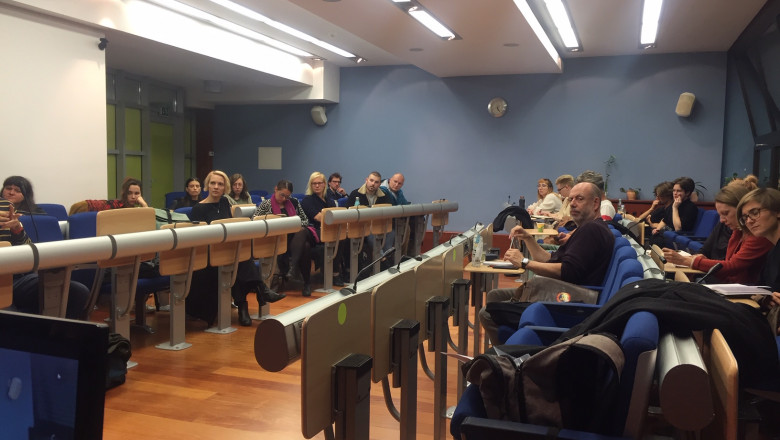
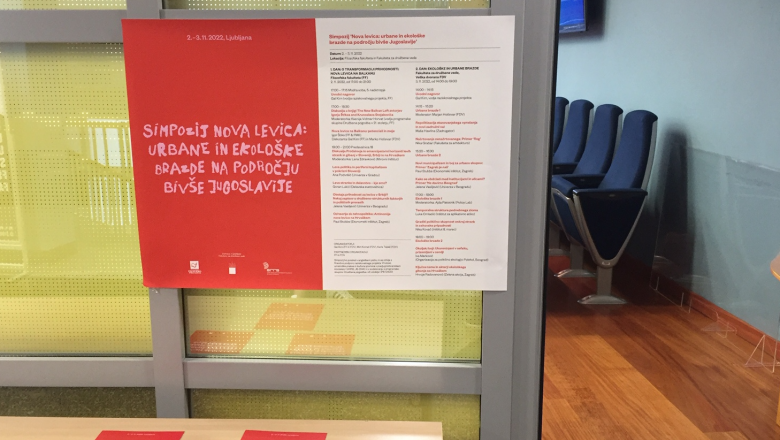
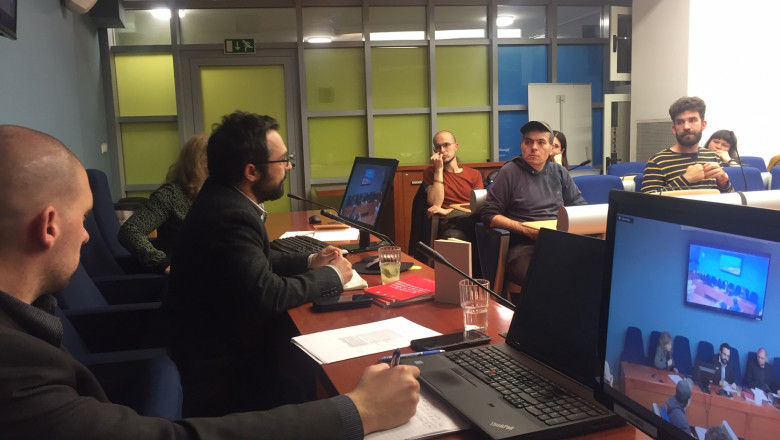
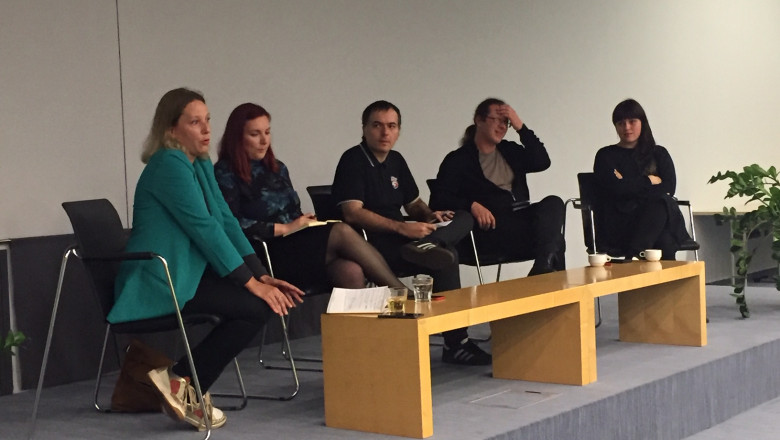
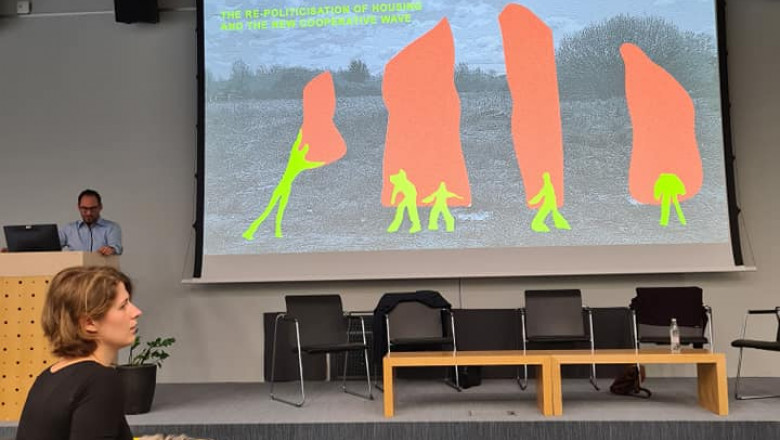
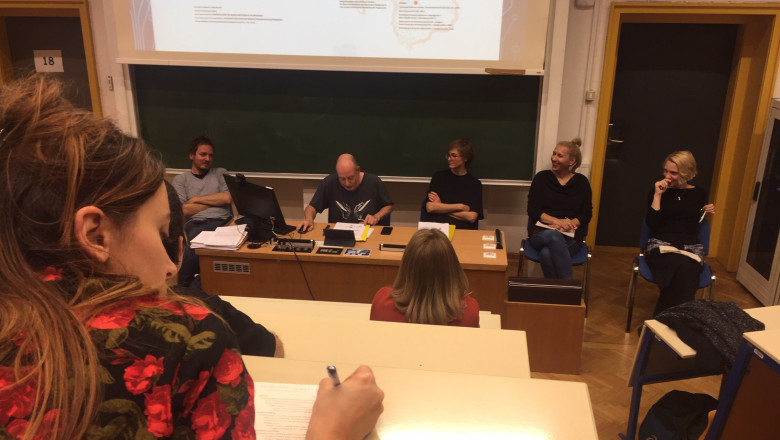
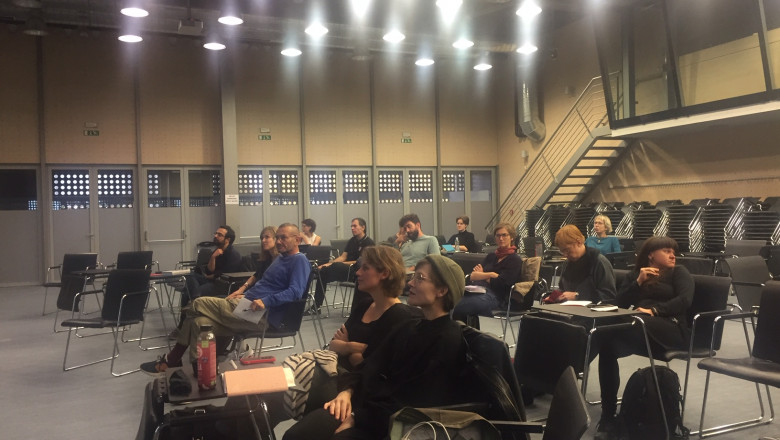
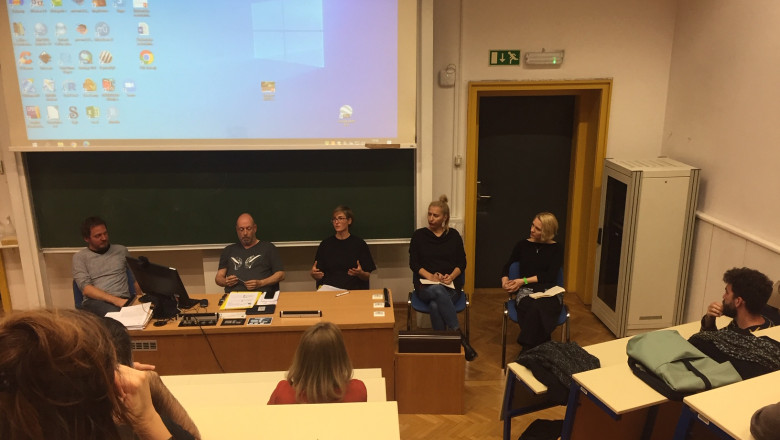
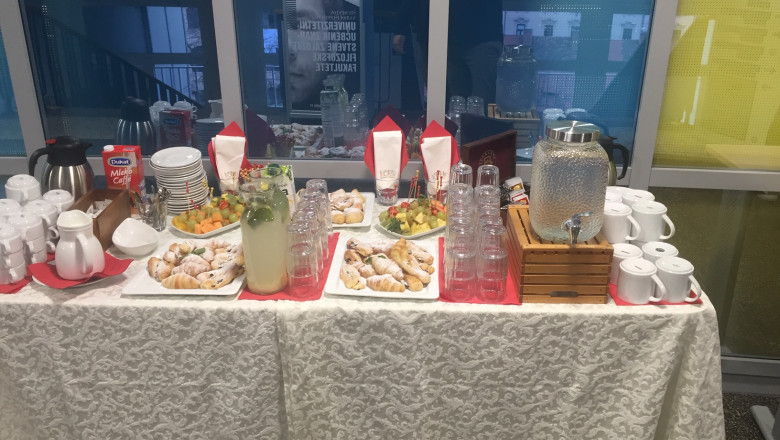
On 15 and 16 September, a two-day symposium "Memory Culture in Flux: from Post-Yugoslavia to Conceptual Problems" will take place. The symposium is organised by Gal Kirn and Ana Hofman, in collaboration with Swedish partners from Sodertorn University. The event is funded by the research projects "Protests, Artistic Practices and Memory Culture in the Post-Yugoslav Context" (ARRS J6-3144) and "Distrusting Monuments. Art and War in the Former Yugoslavia" (21-PR2-0015). See the brochure for the detailed program, abstracts and biographies of the participants.
Some photo snipets from the symposium, ZRC SAZU and Faculty of Arts"
Dr Gal Kirn became an assistant professor of sociology of culture with inaugural lecture "Memory studies: From critique of globalisation to globalisation of memory".
Gal Kirn published an article entitled "Thirty Years after the Break-up of Yugoslavia", Historical Materialism (published online ahead of print 2022, vol. 30 (1). DOI: https://doi.org/10.1163/1569206X-20222261
Short abstract: The contribution sheds a critical light on the thirty years since the break-up of socialist Yugoslavia. It presents three hypotheses for a critical reorientation of the 1989–91 sequence. Firstly, rather than seeing 1989 as the start of the longue durée of a democratic process, for Yugoslavia this trajectory was ‘realised’ as political chaos and ethnic wars in 1991. Secondly, criticising the chronological view of ‘post-socialism’, it posits post-socialism as having already emerged after 1965, marked by market reforms that ‘withered away’ socialism. Thirdly, and specific to the 1990s, in order to facilitate the transition to capitalism, a ‘primitive accumulation’ of memory and a high degree of violence unfolded, which actually dis-accumulated the socialist infrastructure and socialised means of (re)production. The post-Yugoslav transition proved a genuine ‘contribution’ to ‘making our country great again’: ethnically cleansed nation-states on the horizon of European peripheral capitalism. The contribution concludes on an affirmative note, pointing to the slow resurgence of the Left.
At the time of the pandemic and the 14th government of the Republic of Slovenia, some artists began a fluid movement that held up a critical mirror to the situation in culture and other aspects of society. Certain artists took a step out of their regular production in the art world to venture into the broader social arena.
The paper looks at the work of Non-Grupa in 2020/21 and the work of its artists before joining the group to show the consequences of the artist once (s)he steps out of the protected freedom of the art system (Belting) into the open social field. Most important is the transition to self-organization and collectivism, as this changes the conditions of work, the mode of production, and to some extent, also the presentation of works, even if it remains like canonized art in the public space. Thus, the narrative of the works (Raichovich) changes, and with it the formal level on which they function, as does their perception, but at the same time their artivist expression (Milohnič) is reintegrated into the world of art with astonishing speed.
This book intervenes in a field that breaks with revisionist readings of recent and history, which have reduced the reading of the People's liberation struggle to either nostalgic lenses or the demonisation of the past. The book presents a critical and conscious "gathering" of material related to events, episodes, artworks and procedures from the past, in which the author recognises the potential of a lost (forgotten) future - the so-called partisan surplus. The method he proposes, namely the creation of counter-archives, is flexible and suitable for use not only in the case of the "lost" archives of Yugoslavia, but in all archives that today require re-evaluation and reconstruction. The book contains a comprehensive selection of partisan artworks and political moments that formalise the revolutionary temporality, and which in their own way continued in the socialist, and froze, were abandoned in the post-socialist context.
For details see here.
Guest lectures of Prof Igor Štiks and dr Gal Kirn at a Symposium dedicated to the publication of Todor Kuljić's Manifesto of the Left's Memory, 24.2. 2022, University of Belgrade.
This text works at the intersection of film, memory and politics taking the case of Želimir Žilnik’s short film »Uprising in Jazak« (1973) as its object of study. The text presents visual and alternative memory strategies and argues that Žilnik’s film is one of the most prolific examples of making a partisan film in a partisan way from the epoch of socialist Yugoslavia. «. Žilnik’s method consists of a delicate bottom up ethnographic reconstruction of partisan and antifascist memory of the poor villagers in Vojvodina (village Jazak) who − 30 years after the war – collectively tell and renegotiate the stories of the antifascist resistance from the war. The visual language and method of Žilnik stays immensely actual today in post-socialist times of historical revisionism, also in terms of political message. Article has open access.
Dr. Petja Grafenauer and dr. Daša Tepina, members of the research team, will present at the conference at The Ural branch of the Russian Academy of Painting, Sculpture and Architecture of Ilya Glazunov (Russia, Perm) on 26.11. 2021. The lecture is entitled "Protests in Slovenia 2020/2021: Art and Struggle for Autonomy"
Researchers of the project Petja Grafenauer and Daša Tepina held a lecture "Disharmony as a creative force: autonomous zones, art and rebellion in Ljubljana 2020/21" at BARTF Umetnost i kultura danas / Art and culture today, Niš, 8 - 9. 10. 2021.
Principle investigator Dr Gal Kirn will hold a lecture »Filmic Counter-Archive: Emancipating Yugoslav Anti-Fascism Today« at the international workshop »Transgenerational corpographies of memory«, University of Potsdam.
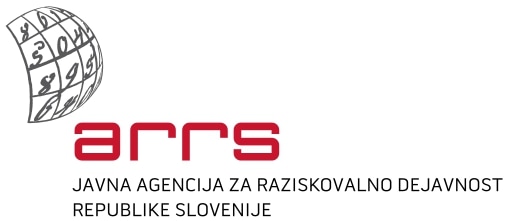
The research project is (co) financed by the Slovenian Research Agency.
